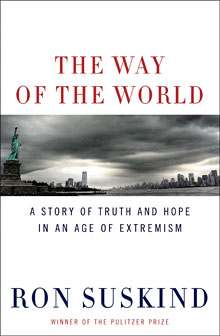The Way of the World (book)
 |
|
| Author | Ron Suskind |
|---|---|
| Country | United States |
| Language | English |
| Subject | Politics |
| Publisher | Harper |
|
Publication date
|
August 5, 2008 |
| Pages | 432 |
| ISBN | |
| OCLC | 232118567 |
The Way of the World: A Story of Truth and Hope in an Age of Extremism is a 2008 non-fiction book by Ron Suskind, a Pulitzer Prize-winning author, describing various actions and policies of the George W. Bush administration. Most notably, it alleges that the Bush administration ordered the forgery of the Habbush letter to implicate Iraq as having ties to al Qaeda and the organizers of the September 11, 2001 attacks. The book, published on August 5, 2008, by Harper, met mixed reviews but received considerable media attention and created controversy. Anticipation of the commercial success of the book was high, with The Wall Street Journal reporting that it was the "biggest release" of a crop of late-summer "big titles".
In the book, Suskind details and describes a variety of actions, policies, and procedures of the Bush administration. The most widely publicized allegation in the book is that high-ranking White House officials ordered the Central Intelligence Agency (CIA) to forge or manufacture a false-pretense for the Iraq war through a backdated, handwritten document ― namely, the Habbush letter ― linking Saddam Hussein and al-Qaeda. The letter purported to be from General Tahir Jalil Habbush al-Tikriti, the head of Iraqi Intelligence, to Saddam Hussein, detailing training which 9/11 hijacker Mohamed Atta supposedly received in Iraq and mentioning receipt of a shipment from Niger. Suskind says that the CIA forged this letter before the 2003 Iraq invasion, on an order from the White House. The author also claims that the Bush administration had information from a top Iraqi Intelligence official, General Tahir Jalil Habbush al-Tikriti, "that there were no weapons of mass destruction in Iraq – intelligence they received in plenty of time to stop an invasion". Suskind further states that Vice-President Dick Cheney implemented a set of procedures and processes designed to make the President less involved and less accountable for various controversial decisions and actions.
...
Wikipedia
